Clamming and Shellfish License
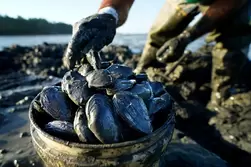
Licenses are available in the Town Clerk's office M-F, 8:30 a.m. to 5 p.m.
The town also produces a small pamphlet with harvesting information and links to important information.
The Town of Southwest Harbor manages the steamer clam resources, and license cost.
*$20.00 for Residents
*$40.00 for Non-Residents
*$0.00 for Minors aged 16 and younger (while with an adult who has an active permit)
This entitles the bearer to harvest one peck per day of clams larger than 2" for personal use only. Mussels are managed by the State of Maine, and no license is required to collect up to two bushels per day of mussels of any size from open area for personal use only. (Map of open areas)
About half of the shoreline of Southwest Harbor is normally open for the taking of clams and mussels, but it is your responsibility to check with the State DMR to make sure that no temporary closures are in effect due to rainfall or red-tide.
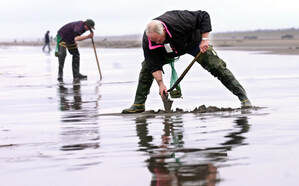
According to Maine common law in effect since statehood in 1820, the public has a right to use the inter-tidal zone for fishing, fowling, and navigation. The courts have held that digging or collecting shellfish is one of the activities covered under "fishing". But you must legally access the inter-tidal zone, either with the express permission of the upland landowner or through public access to the shore. Fortunately, some of the best shellfishing in Southwest Harbor is readily accessible.
Let's go DIGGING!
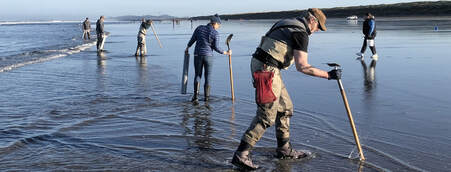
A very good clam-flat is accessible by the nearby road crossing at the head of Fernald Cove about a mile from Rt. 102 on Fernald Point Road. Parking is available in the NPS Flying Mountain parking lot, or you can park along the road at the head of the cove. Make your way carefully down the stones to the foreshore and select your location. As you are digging, stand up and rest your back every once in a while and appreciate the stunning view! Clams can also be found at Ship Harbor and Wonderland in Acadia National Park.
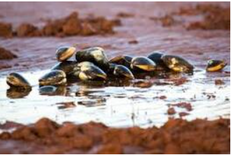
Mussels can be collected at Valley Cove, Fernald Point, or Seawall.
Just be careful of the slippery rocks and seaweed!
Clam hoes can be purchased at the McEachern and Hutchins hardware store in the center of Town or at Hamilton Marine at the end of Clark Point Road.
Safety and Regulations
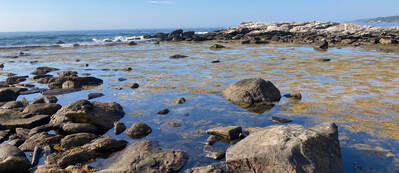
Remember that when you are gathering mussels or digging clams that you are on mucky or rocky tidal flats that will be covered by about 10 feet of ocean at the next high tide. Wear appropriate footwear; be very careful walking on slippery seaweed and wet rocks; and don't get stranded by the rising tide. You can check the tide schedule here.
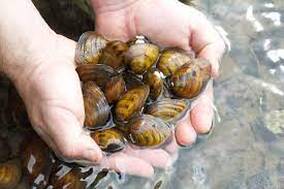
Weather you dig clams or collect mussels, you will want to wash them before you bring them home to prepare for consumption. The best way to do that is to gently wash them with your hands in the nearest source of clean water. At this point you are simply trying to remove surface dirt and other unpalatable materials, so you can wash them in clear ocean water, a nearby brook, or with a hose and pail at home. But before you cook them scrub them more vigorously in the kitchen sink and remove and of the beards (byssal threads) of mussels. In order to evacuate the digestive system of the shellfish, many people like to soak their freshly collected shellfish in clean water prior to cooking and consumption; cornmeal can be added to the soaking water for a more appealing meal, but it is not necessary for health protection.
AT THIS POINT, WE NEED TO STRESS TWO THINGS:
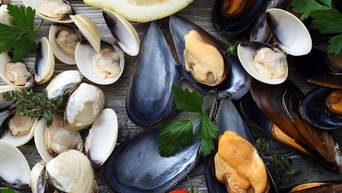
Neither clams nor mussels should be consumed raw; there is simply too much risk in consuming raw mussels or clams. You do not want to cook clams or mussels that are open prior to cooking. If the clams or mussels do not open during cooking, dispose of them. This will eliminate the risk of cooking and eating diseased or dead shellfish.
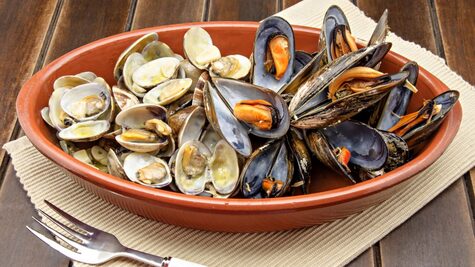
Most recipes involve steaming them in a small amount of water with herbs and spices until they open, or they can be fried, baked, or broiled. The choice is yours, bon appetite!